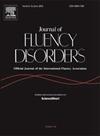Stuttering as an act of love
IF 2.1
3区 医学
Q1 AUDIOLOGY & SPEECH-LANGUAGE PATHOLOGY
引用次数: 0
Abstract
For us to love each other we must first know each other. We come to know each other through communication, the purpose of which is communion. Traditionally, we think of stuttering as impairing this communion. Stuttering prevents us from sharing ourselves with others by distorting our message and increasing the effort it takes for us to speak. This need not be the case. Our stuttering is as much a part of us as any other attribute. For others to know us deeply, they must also know our stuttering. Likewise, for us to know others, we must know how they react to us – all of us – including our stuttering. In this paper, I propose that by stuttering openly and sincerely we share more of ourselves with others and, therefore, enter a deeper communion than would be possible if we hid our disfluencies. Stuttering introduces vulnerability into our conversations that would be absent had we been fluent. This vulnerability, when reciprocated, allows for intimacy. Research demonstrates that our stuttering impacts us less negatively when we are more open and speak with more spontaneity. By embracing our stutters, we not only lessen the negative impact of stuttering, but we also increase our ability to know, and therefore, love each other.
口吃是一种爱的行为。
要彼此相爱,我们必须先了解对方。我们通过交流来了解彼此,交流的目的是交流。传统上,我们认为口吃会损害这种交流。口吃通过扭曲我们的信息和增加我们说话的努力来阻止我们与他人分享我们自己。事实并非如此。我们的口吃和我们的其他特质一样,都是我们的一部分。别人要想深入了解我们,就必须了解我们的口吃。同样地,为了了解他人,我们必须了解他们对我们的反应——包括我们的口吃。在这篇论文中,我建议,通过公开和真诚的口吃,我们可以与他人分享更多的自己,因此,与隐藏自己的不流畅相比,我们可以进入更深层次的交流。口吃在我们的谈话中引入了脆弱,如果我们说得流利,就不会有这种脆弱。这种脆弱,如果得到回报,就会产生亲密关系。研究表明,当我们更开放、说话更自然时,口吃对我们的负面影响会更小。通过拥抱我们的口吃,我们不仅减少了口吃的负面影响,而且还增加了我们了解彼此的能力,因此,我们彼此相爱。
本文章由计算机程序翻译,如有差异,请以英文原文为准。
求助全文
约1分钟内获得全文
求助全文
来源期刊

Journal of Fluency Disorders
AUDIOLOGY & SPEECH-LANGUAGE PATHOLOGY-REHABILITATION
CiteScore
3.70
自引率
14.30%
发文量
23
审稿时长
>12 weeks
期刊介绍:
Journal of Fluency Disorders provides comprehensive coverage of clinical, experimental, and theoretical aspects of stuttering, including the latest remediation techniques. As the official journal of the International Fluency Association, the journal features full-length research and clinical reports; methodological, theoretical and philosophical articles; reviews; short communications and much more – all readily accessible and tailored to the needs of the professional.
 求助内容:
求助内容: 应助结果提醒方式:
应助结果提醒方式:


